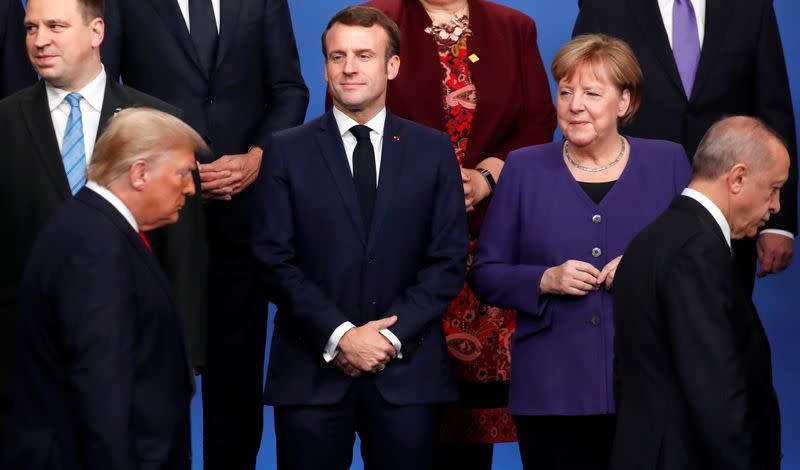Not so nasty: NATO avoids a car crash summit
By Robin Emmott and Michel Rose
WATFORD, England (Reuters) - It was shaping up for a repeat of NATO's disastrous summit of July 2018, when U.S. President Donald Trump unleashed a tirade against European allies and threatened to pull America out of the transatlantic military alliance forged after World War Two.
French President Emmanuel Macron had stunned other leaders in the run-up to Wednesday's meeting in a country estate on the outskirts of London by declaring that NATO was "experiencing brain death", a comment Trump branded "very, very nasty".
But at their three-hour session, the leaders agreed to appoint a group of experts to conduct a strategic review over two years to prepare the Western alliance for the future - and as they headed home there was little evidence of the public acrimony that had preceded their summit.
Diplomats said the "brain-death" debate was key to avoiding a bust-up, possibly spurring Trump to take a more positive view of the alliance than he has in the past.
Amid the consternation over Macron's comment, France and Germany last month proposed a study of NATO's future by a group of "wise men". Their idea was vague but, according to a senior NATO diplomat, alliance Secretary-General Jens Stoltenberg seized on it to take some heat out of the summit.
"It was very useful," an adviser to Macron said. "Had he not sparked this debate, they would have come here, raised a toast to the Queen and ... gone home even though we're going through a challenging international moment."
Macron himself told reporters the outcome of the summit had "demonstrated the usefuleness of our comments", and likened himself to an ice-breaking ship cutting through frozen seas.
"It leaves broken ice but it also opens a passage," he said.
"A MILDER TRUMP"
Diplomats put the meeting's relative success down to the behavior of Trump, who throughout the 2018 summit had questioned the value of NATO in tweets and berated allies for not spending enough on defense.
Aside from a complaint that Canadian Prime Minister Justin Trudeau was "two-faced" after a hot mic caught him mocking the U.S. president, diplomats said Trump was unusually conciliatory.
In a meeting with German Chancellor Angela Merkel he complained mildly that Berlin was "a little bit under" the target for NATO allies to spend 2% of their GDP on defense.
"I can only say that we had a good discussion on substance," Merkel told reporters. "We had room for other, more strategic questions. I had the impression that mutual understanding of the different geographical situations is growing."
One European diplomat said "we saw a very mild Trump", and another said he was "more a team-player than a disruptor".
U.S. officials said Trump has been placated by increases in defense spending by NATO allies, and other leaders appear to have learnt to deal with his mercurial nature at such events.
Trump faces impeachment troubles at home and must gird for what is expected to be a tough battle for re-election next year.
"Would it be in his interest to start international clashes in a context of domestic political campaign? I don't think that would pay off," the second diplomat said.
Once a relic of the Cold War, and long criticized for failing to meet security challenges such as global terrorism, the alliance found new resolve on its eastern flank after Russia's annexation of Crimea from Ukraine in 2014.
But Turkey's October operation into Syria, against allies' wishes, and Trump's zig-zagging position on NATO have led diplomats to question the alliance's broader strategy.
In their final statement, leaders said they were "taking into account the evolving strategic environment" and tasked Stoltenberg to report back, probably next April, with plans "for a forward-looking reflection process".
Ideas raised by diplomats include developing NATO's original remit, since its 1949 foundation, of protecting Europe and North America, to potentially encompass new areas such as Syria's eight-year-old civil war and the Middle East.
Some diplomats said the reflection risks being long and it could turn NATO into another political club with no legislative powers, making statements about conflicts beyond its control.
However, Paris and Berlin say that want an alliance that is more agile, and Trump - who once described NATO as "obsolete" - praised it at the summit as more "flexible".
(Additional reporting by Steve Holland and Andreas Rinke; Writing by John Chalmers, Editing by William Maclean)




